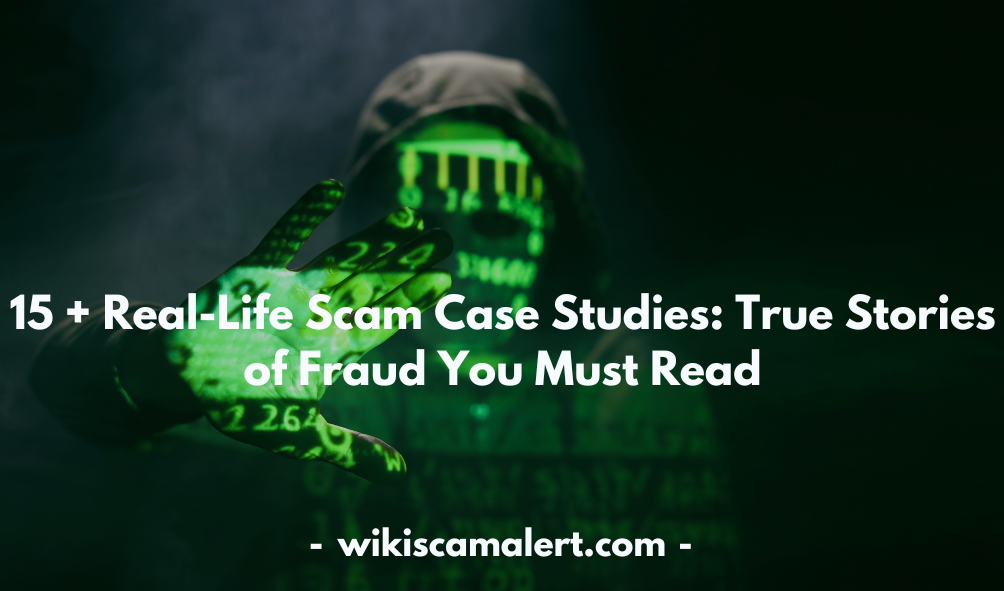Scams are everywhere, and no one is immune. Whether it’s a fake legal service, a fraudulent investment scheme, or an online marketplace scam, millions of people lose their money to scammers every year. The best way to protect yourself? Learn from the mistakes of others.
In this article, we’ll explore real scam case studies, uncovering how they worked, the tactics scammers used, and how you can stay safe.

Real Scam Case Studies – Deep Dive into Financial and Online Frauds
Scams have existed for centuries, but in today’s digital world, they have become more sophisticated and widespread. Understanding real scam case studies can help you recognize red flags and avoid becoming a victim.
Below, we explore some of the most infamous scams in finance, online fraud, identity theft, Ponzi schemes, and cryptocurrency.
Real Scam Case Studies in Finance and Investment
Bernie Madoff’s Ponzi Scheme – The Largest Investment Scam in History
Bernie Madoff’s investment firm promised consistent, high returns to investors. However, instead of investing the money, he used funds from new investors to pay returns to older investors—a classic Ponzi scheme.
What Happened?
● Madoff’s scheme lasted for decades, scamming investors out of $65 billion.
● When the 2008 financial crisis hit, investors tried to withdraw funds, exposing the fraud.
● Madoff was arrested and sentenced to 150 years in prison.
Lesson Learned: If an investment promises guaranteed, high returns with no risk, it’s likely a scam.
Allen Stanford’s $7 Billion Investment Fraud
Allen Stanford operated a fake investment company, offering high-yield CDs (certificates of deposit). However, these CDs didn’t exist, and he was running a Ponzi scheme.
How the Scam Worked
● He convinced investors from 100+ countries to invest billions.
● He used new investments to pay previous investors and fund his lavish lifestyle.
● Eventually, the scheme collapsed, and he was sentenced to 110 years in prison.
Lesson Learned: Always verify financial institutions through regulatory authorities before investing.
Online Scams and Fraudulent Websites
The Fake Amazon Refund Scam
Scammers pretended to be Amazon representatives, calling customers about bogus refunds. Victims were tricked into giving remote access to their computers, allowing scammers to steal money.
How It Worked
● The scammer called and claimed the victim was owed a refund.
● They tricked victims into “accidentally” refunding too much money.
● To “fix” the issue, victims transferred money back—which actually went straight to the scammer.
Lesson Learned: Amazon never calls to offer refunds. Always contact companies through their official website.
Court-Cases-Online.org Scam – Fake Legal Assistance
This fraudulent website charged victims for fake court case updates.
How It Trapped Victims
● People searching for case updates found the website.
● They were asked to pay a fee for “exclusive legal documents.”
● After payment, victims received nothing and lost their money.
Lesson Learned: Verify legal services with official government websites before making payments.
Identity Theft and Personal Data Breaches
The Equifax Data Breach – Millions of Identities Stolen
In 2017, Equifax, one of the largest credit bureaus, suffered a massive data breach, exposing the personal information of 147 million Americans.
How It Happened
● Hackers exploited a security vulnerability in Equifax’s system.
● Names, addresses, birthdates, Social Security numbers, and credit card details were stolen.
● The breach cost Equifax $700 million in settlements.
Lesson Learned: Use credit monitoring services and enable two-factor authentication to protect personal data.
Synthetic Identity Theft – A Growing Threat
Scammers combine real and fake information to create new, fraudulent identities for financial gain.
Example Case
● A criminal used a child’s Social Security number and combined it with a fake name.
● They built credit over time and took out loans and credit cards.
● Years later, when the child applied for a credit card, they discovered they already had a ruined credit history.
Lesson Learned: Regularly check your credit report for unauthorized accounts.
Ponzi Schemes and Pyramid Scams
OneCoin – The Fake Cryptocurrency That Stole $4 Billion
OneCoin was promoted as the next Bitcoin, but in reality, it was a Ponzi scheme. The founder, Ruja Ignatova, disappeared in 2017, and investors lost billions of dollars.
How the Scam Worked
● Investors paid real money to buy OneCoin, but the coin was fake.
● Early investors were paid with new investors’ money.
● When people tried to cash out, they realized OneCoin had no value.
Lesson Learned: Always verify if a cryptocurrency is listed on major exchanges before investing.
MMM Global – The Multi-Billion Dollar Pyramid Scheme
MMM Global promised huge returns for “helping others.” However, it was a classic pyramid scheme, where profits depended on recruiting new members.
Why It Failed
● There was no real product or investment—just a cycle of new members paying old members.
● Eventually, the system collapsed, and people lost everything.
Lesson Learned: If a scheme relies solely on recruitment, it’s a scam.
Cryptocurrency and NFT Scams
The Bitconnect Scam – A Crypto Ponzi Scheme
Bitconnect promised 40% monthly returns, claiming its AI trading bot would guarantee profits. However, it was one of the biggest crypto Ponzi schemes in history.
How It Collapsed
● Bitconnect’s token price skyrocketed, attracting new investors.
● Eventually, regulators shut it down, and investors lost everything.
● The founders disappeared, and lawsuits followed.
Lesson Learned: If it sounds too good to be true, it probably is.
Fake NFT Sales and Rug Pulls
NFTs (Non-Fungible Tokens) have become a hot market, but scammers exploit it through fake projects and rug pulls.
Example: Frosties NFT Scam
● Developers sold thousands of NFTs, promising future rewards.
● After raising over $1.1 million, they disappeared and shut down the project.
Lesson Learned: Research NFT projects thoroughly before investing
Real Scam Case Studies – Exposing Fraud Across Industries
Scammers are getting more sophisticated, targeting unsuspecting victims through fake legal services, online marketplaces, social media, business fraud, and romance scams. Understanding these real scam case studies will help you spot red flags and protect yourself from financial and emotional devastation.
Let’s break down some of the most infamous scams in these categories and the valuable lessons they teach us.
Fake Legal Services and Lawsuit Scams
Prestige Legal Solutions Lemon Law Case Scam – Fake Lawyers Preying on Car Buyers
Many consumers who had lemon law cases (faulty vehicle claims) fell victim to Prestige Legal Solutions, a fraudulent law firm that scammed clients out of thousands of dollars.
How It Worked
● The scammers posed as lemon law attorneys, offering to settle cases quickly.
● They charged upfront fees for legal representation.
● After receiving payment, they cut off communication and disappeared.
Lesson Learned: Legitimate lawyers do not demand large upfront payments without a proper contract. Always verify their credentials with your state bar association.
Court-Cases-Online.org Scam – Paying for Fake Lawsuit Information
This fraudulent website claimed to provide exclusive access to legal case details for a fee.
How It Scammed Victims
● The website appeared professional and promised to help users track ongoing lawsuits.
● Users paid a fee to access supposed legal documents.
● After payment, they received nothing and the site vanished.
Lesson Learned: Official court records are usually available for free or at a small government fee. Always use official court websites.
E-Commerce and Online Marketplace Fraud
Facebook Marketplace and eBay Scams – Selling Fake or Nonexistent Items
Many online shoppers have fallen victim to fraudulent sellers who either ship counterfeit goods or don’t ship anything at all.
Example Scam: The Expensive Camera That Never Arrived
● A buyer found a high-end camera at a discount on Facebook Marketplace.
● The seller insisted on payment via Zelle or Cash App, promising fast shipping.
● After receiving the money, the seller disappeared, and the buyer never got the camera.
Lesson Learned: Use platforms with buyer protection, like PayPal, and avoid direct payments to strangers.
Amazon Brushing Scam – Fake Reviews and Free Packages
Scammers send unsolicited packages to people’s homes and leave fake reviews in their names to boost product rankings.
How It Works
● A scam company buys its own products using real Amazon accounts.
● They ship the items to random addresses to appear legitimate.
● The company posts fake positive reviews, making their products seem high-quality.
Lesson Learned: Receiving unexpected packages could mean your personal data was compromised. Monitor your online accounts for suspicious activity.
Social Media and Influencer Scams
Instagram Luxury Giveaway Scams
Fake influencers promise luxury items like iPhones, designer bags, or cash prizes in exchange for follows, likes, and comments.
How They Trick You
● The scammer posts a high-quality image of prizes and asks users to tag friends and share.
● They ask winners to pay a “shipping fee” before receiving their prize.
● No one ever receives the promised items.
Lesson Learned: If an influencer’s giveaway requires upfront payments, it’s a scam.
The Crypto Investment Scam – Fake Influencers Promoting Fraudulent Coins
Many Instagram, TikTok, and YouTube influencers have been caught promoting worthless cryptocurrencies to their followers.
Example: The SaveTheKids Token Scam
● A group of influencers hyped a new cryptocurrency to encourage investments.
● Once followers purchased the token, the influencers sold their holdings, causing the value to crash.
● Investors lost thousands of dollars, and the influencers faced backlash.
Lesson Learned: Never invest in financial schemes promoted by influencers without proper research.
Business Email Compromise (BEC) and Corporate Fraud
The CEO Fraud Scam – Tricking Employees into Wiring Millions
Hackers impersonate a company’s CEO or senior executive and request an urgent wire transfer from employees.
Real Case: Ubiquiti Networks Lost $46 Million
● Scammers sent fake emails posing as Ubiquiti’s CEO.
● Employees, believing the request was real, wired $46 million to fraudulent accounts.
● The company never recovered the stolen money.
Lesson Learned: Always verify financial requests, especially large transactions, via phone or video call.
The Vendor Payment Fraud – Fake Invoice Scam
Hackers gain access to a company’s emails and modify payment details on invoices.
Example Case
● A business received an invoice from what appeared to be a regular vendor.
● However, the bank account details were changed by hackers.
● The company wired $500,000 to the scammers instead of the real vendor.
Lesson Learned: Always confirm payment details with vendors using official communication channels.
Romance Scams and Online Dating Fraud
The Tinder Romance Scam – Losing Life Savings to a Fake Lover
Scammers create fake online dating profiles, gain victims’ trust, and then ask for money, gifts, or cryptocurrency.
Example: The “Tinder Swindler” Scam
● A scammer posed as a wealthy businessman on Tinder.
● He convinced victims to take out loans to help him with “temporary financial issues.”
● Victims never got their money back, while the scammer continued his lavish lifestyle.
Lesson Learned: Never send money to someone you’ve never met in person.
The Military Romance Scam – Fake Soldiers Asking for Money
Scammers pretend to be military personnel deployed overseas and request financial help.
How It Happens
● The scammer claims they can’t access their bank account while on duty.
● They ask for money for travel expenses, medical bills, or emergencies.
● After receiving funds, they cut off communication.
Lesson Learned: The U.S. military does not request money from soldiers through strangers online.
Real Scam Case Studies – Protect Yourself from Fraud
Scammers are constantly coming up with new ways to trick individuals and businesses into handing over money or sensitive information. From fake job offers and lottery scams to real estate fraud and ransomware attacks, these scams have destroyed lives and cost victims billions of dollars.
Below, we’ll explore real scam case studies in five major fraud categories, breaking down how they work, real-life examples, and lessons learned to stay safe.
Job Scams and Fake Recruitment Agencies
The Work-From-Home Scam – Paying for a Job That Doesn’t Exist
Scammers take advantage of job seekers by posting fake work-from-home opportunities that require an upfront payment for training or supplies.
Example: The Fake Amazon Job Offer
● A victim received an email about a high-paying Amazon job requiring no experience.
● The recruiter asked for a “registration fee” to secure the job.
● After paying, the company stopped responding, and no job existed.
Lesson Learned: Legitimate employers never ask for payment during hiring. Always verify job offers with the company directly.
Fake Recruitment Agencies Charging Fees for Job Placements
Some fraudsters create fake employment agencies that charge hefty fees to place candidates in non-existent jobs.
Example: The International Work Visa Scam
● A recruitment agency promised a dream job abroad but required a visa processing fee.
● The victim paid thousands but never received any job offer.
● The agency vanished, leaving victims stranded.
Lesson Learned: Use verified recruitment agencies and never pay upfront for job placements.
Lottery, Sweepstakes, and Prize Scams
The Fake Lottery Win – “You’ve Won! Now Pay the Fee”
Scammers send emails or calls claiming you’ve won a lottery or prize, but you must pay taxes or processing fees before receiving the winnings.
Example: The Mega Millions Lottery Scam
● A senior citizen received a phone call claiming she won $500,000.
● She was instructed to wire $5,000 in taxes to claim the prize.
● After paying, no prize arrived, and the scammers demanded more money.
Lesson Learned: If you didn’t enter a lottery, you didn’t win. Real lotteries do not ask for upfront fees.
The Facebook Giveaway Scam – Fake Celebrity Sweepstakes
Scammers impersonate celebrities and brands on social media, promising expensive prizes to followers.
Example: The Fake MrBeast Giveaway
● Scammers created a fake MrBeast YouTube giveaway, promising cash prizes.
● Participants had to pay a “small deposit” to enter.
● After sending money, they never received any winnings.
Lesson Learned: Verify giveaways through official websites and never send money to claim a prize.
Real Estate and Rental Fraud Cases
The Rental Deposit Scam – Paying for a Home That Doesn’t Exist
Scammers pose as landlords and list fake rental properties online, demanding deposits upfront before letting tenants view the home.
Example: The Craigslist Rental Scam
● A college student found a cheap apartment listing on Craigslist.
● The “landlord” said he was out of town but could secure the rental for a deposit.
● After wiring the money, the listing disappeared, and the student lost their deposit.
Lesson Learned: Always visit a rental in person and verify the landlord’s identity before making payments.
The Mortgage Fraud Case – Foreclosure Rescue Scams
Homeowners facing foreclosure are tricked into signing over their property deeds in exchange for supposed financial assistance.
Example: The Foreclosure Relief Scam
● A company promised to help struggling homeowners refinance.
● Victims signed documents, unknowingly transferring their home titles.
● The scammers took ownership of the properties and evicted the homeowners.
Lesson Learned: Consult legal experts before signing real estate contracts, and only work with verified mortgage professionals.
Charity and Donation Scams
Fake Charity Websites – Exploiting Tragedies for Money
Scammers create fake charities after natural disasters or tragedies, collecting donations that never reach victims.
Example: The Hurricane Relief Scam
● A fake website was set up to collect donations for hurricane victims.
● Donors sent money via GoFundMe and PayPal, believing it was legitimate.
● The scammers kept the funds, and victims received no aid.
Lesson Learned: Donate only to well-known charities and verify fundraising campaigns before contributing.
Door-to-Door Charity Scams – Fake Fundraisers Knocking on Your Door
Some fraudsters pose as charity workers, asking for cash donations on the spot.
Example: The Bogus Cancer Charity
● Scammers dressed in charity uniforms and collected donations in person.
● They provided fake receipts to appear legitimate.
● Later, the charity was exposed as non-existent, and funds were pocketed.
Lesson Learned: Ask for official charity registration details and verify before donating.
Phishing and Ransomware Attacks
The CEO Email Scam – Fake Boss Requests Urgent Payments
Hackers spoof company emails, pretending to be CEOs or senior managers, and instruct employees to send urgent payments.
Example: The Twitter Phishing Attack
● A hacker gained access to Twitter’s internal systems through a phishing attack.
● They tricked employees into resetting passwords, allowing them to take over high-profile accounts.
● The hacker tweeted a Bitcoin scam from celebrity accounts, stealing thousands of dollars.
Lesson Learned: Verify all unusual email requests and enable multi-factor authentication (MFA).
The Ransomware Attack – Holding Data Hostage for Money
Hackers infect computers with ransomware, encrypting files and demanding a ransom to restore access.
Example: The WannaCry Ransomware Attack
● A ransomware virus spread worldwide, locking files on hospitals, banks, and businesses.
● Hackers demanded Bitcoin payments to unlock data.
● Many victims paid but never regained access to their files.
Lesson Learned: Regularly back up data and never pay ransoms to cybercriminals.
Real Scam Case Studies – How Scammers Exploit Trust and Systems
Scammers target individuals, businesses, and even governments, using deception to steal money, manipulate trust, and exploit weaknesses. From government corruption to fake tech support calls, these frauds cost billions of dollars every year.
In this section, we’ll break down real scam case studies in government, healthcare, tech support, travel, and phone fraud, showing you how they work and how to protect yourself.
Government and Political Corruption Scandals
Government corruption is one of the most damaging types of fraud, affecting millions of people. Corrupt officials misuse funds, accept bribes, and manipulate policies for personal gain.
The 2G Scam Case – India’s Biggest Telecom Corruption Scandal
What Happened?
● In 2008, India’s 2G telecom spectrum licenses were issued at low prices through a corrupt process.
● Government officials favored certain companies in exchange for bribes.
● The scam cost the Indian government an estimated $39 billion in revenue losses.
Lesson Learned: Transparency and accountability in government contracts are crucial. Citizens must demand anti-corruption measures.
The Operation Car Wash Scandal – Brazil’s Largest Bribery Scheme
What Happened?
● In Brazil, major corporations bribed politicians and government officials to win contracts.
● The oil company Petrobras was at the center of the scandal.
● Investigations uncovered billions of dollars in kickbacks, involving high-ranking officials.
Lesson Learned: Bribery and fraud undermine economies. Public oversight and independent investigations help expose corruption.
Medical and Healthcare Fraud Cases
Healthcare fraud is one of the fastest-growing crimes, costing billions in fraudulent billing, fake treatments, and insurance scams.
The Prestige Legal Solutions Lemon Law Case Scam
What Happened?
● A fraudulent legal group claimed to help consumers with car lemon law cases.
● Victims paid thousands in legal fees, but the company provided no real services.
● The firm disappeared, leaving customers without legal recourse.
Lesson Learned: Verify legal firms before making payments. Check for legitimate registrations and client reviews.
Fake Medicare Billing – Overcharging for Services Not Provided
What Happened?
● A Florida medical clinic billed Medicare for expensive treatments never performed.
● The fraudsters made millions of dollars before being caught.
● Patients were unaware their Medicare numbers were being misused.
Lesson Learned: Always review your medical bills and insurance statements. Report suspicious charges.
Fake Tech Support and Software Scams
Tech support scams trick users into believing their computer has a virus and demand payment for fake repairs.
The Microsoft Tech Support Scam – Fake Calls to Fix Non-Existent Viruses
What Happened?
● Scammers called victims pretending to be from Microsoft, claiming their computer was infected.
● They remotely accessed victims’ devices, installed fake software, and charged fees for “fixes.”
● Some victims lost access to their data after refusing to pay further demands.
Lesson Learned: Microsoft and other tech companies never call users about computer issues. Always verify tech support requests.
The Fake Antivirus Scam – Pop-Up Warnings Leading to Malware
What Happened?
● Victims saw pop-up messages claiming their device was infected.
● Clicking the message led to a fake security software download.
● The software locked their computer until they paid a ransom.
Lesson Learned: Never download software from pop-ups. Use only trusted antivirus programs.
Travel and Vacation Scams
Vacation scams target travelers with fake deals, fraudulent rentals, and hidden fees.
The Fake Airbnb Listing Scam – Paying for a Non-Existent Rental
What Happened?
● Travelers booked vacation homes on fake websites mimicking Airbnb.
● After making payments, they arrived to find the property did not exist.
● Scammers disappeared with thousands of dollars in stolen funds.
Lesson Learned: Always book through verified websites and never pay via wire transfers.
The Free Cruise Scam – “You’ve Won a Trip!” but There’s a Catch
What Happened?
● Victims received emails and phone calls claiming they had won a luxury cruise.
● To claim the prize, they had to pay “taxes and fees” upfront.
● The scammers collected millions of dollars, and no one received a trip.
Lesson Learned: If it sounds too good to be true, it probably is. Always verify travel offers.
Phone and SMS Fraud Cases
Phone scams manipulate victims into revealing sensitive information or sending money.
The IRS Phone Scam – Fake Tax Officials Demanding Payment
What Happened?
● Victims received threatening calls from fake IRS agents.
● The scammers demanded immediate tax payments or threatened arrest.
● Many victims lost thousands of dollars out of fear.
Lesson Learned: Government agencies never demand payments over the phone. Always verify before paying.
The Bank SMS Scam – Fake Alerts Stealing Banking Information
What Happened?
● Victims received fake text messages claiming suspicious bank activity.
● The texts contained phishing links, leading to fake login pages.
● Once victims entered their credentials, scammers emptied their bank accounts.
Lesson Learned: Never click links in unsolicited texts. Always verify directly with your bank.
Notorious Real Scam Case Studies
The Prestige Legal Solutions Lemon Law Case Scam
Imagine needing legal help and turning to a firm that promises justice—only to realize later that they scammed you. That’s exactly what happened with the Prestige Legal Solutions Lemon Law case scam.
How It Worked
● The firm claimed to specialize in lemon law cases, helping consumers get refunds for defective vehicles.
● They charged high upfront fees but provided no actual legal services.
● Victims only realized the scam when they couldn’t get a response after paying.
Red Flags to Watch For
No official business address or verifiable legal credentials
Demanding upfront payments before legal services
Poor or no online reviews
Court-Cases-Online.org Scam – A Fake Legal Aid Trap
Many people turn to online legal aid services for help, but some websites prey on vulnerable individuals.
How the Scam Worked
● Court-Cases-Online.org posed as a legitimate legal resource.
● Users were asked to pay fees for case updates—which never existed.
● Victims later discovered that no actual legal services were provided.
How to Avoid This Scam
Always verify a legal service’s legitimacy through official government sources.
Be skeptical of websites asking for money upfront.
Check online reviews and complaints.
The 2G Scam Case – A Billion-Dollar Fraud
One of India’s biggest corruption scandals, the 2G scam case, involved the illegal allocation of telecom licenses.
What Happened?
● Government officials allegedly sold telecom licenses at extremely low prices.
● The country lost billions in potential revenue.
● Several politicians and business executives were charged with corruption.
Impact on the Industry
The case shook public trust in the telecom sector and led to stricter regulatory measures.
Investment Fraud – How Ponzi Schemes Still Work
One of the most famous scam cases in history is Bernie Madoff’s Ponzi scheme.
How Madoff Scammed Investors
● He promised high returns with little risk.
● Instead of investing funds, he paid old investors with new investors’ money.
● The scheme collapsed when he ran out of money.
How to Identify Investment Scams
Guaranteed high returns with no risk
Pressure to invest quickly
No clear business model
Social Media Scams – The Rise of Fake Influencers
Scammers are now using Instagram, TikTok, and YouTube to deceive followers.
Common Social Media Scams
● Fake giveaways – Scammers ask for personal details to claim “prizes”.
● Impersonation scams – Fraudsters pretend to be celebrities or influencers.
● Paid promotions for non-existent products.
How to Stay Safe
● Verify official accounts (blue checkmarks help).
● Avoid sharing personal information online.
● Be wary of too-good-to-be-true giveaways.
Legal Actions and Consequences for Scammers
Many scam cases lead to criminal charges, but some scammers walk free due to loopholes. Governments worldwide are strengthening laws to crack down on fraud.
Protecting Yourself from Scams
Use strong passwords and enable two-factor authentication.
Avoid clicking on suspicious links or emails.
Report scams to authorities or consumer protection agencies.
Conclusion
Scams and fraud are constantly evolving, taking advantage of new technologies and human vulnerabilities. The real-life cases discussed in this collection highlight how scammers manipulate trust, emotions, and digital systems to deceive individuals and businesses. By learning from these true stories, you can recognize warning signs and protect yourself from similar schemes.
Staying informed, practicing caution online and offline, verifying information before acting, and using strong cybersecurity measures are essential in safeguarding your finances and personal data. For real-life examples and valuable lessons, check out 10 Real-Life Scam Stories & Powerful Lessons.
FAQs
1. What should I do if I suspect a scam?
Immediately stop all communication with the scammer and report it to consumer protection agencies.
2. How do I verify if a legal service is legitimate?
Check government directories, read reviews, and contact bar associations to confirm legitimacy.
3. Are Ponzi schemes still happening today?
Yes! New scams appear regularly, targeting investors with fake high-return promises.
4. What is the biggest scam case in history?
Bernie Madoff’s $65 billion Ponzi scheme remains one of the largest financial frauds ever.
5. Where can I report online scams?
You can report scams to the FTC, FBI, or local law enforcement.










